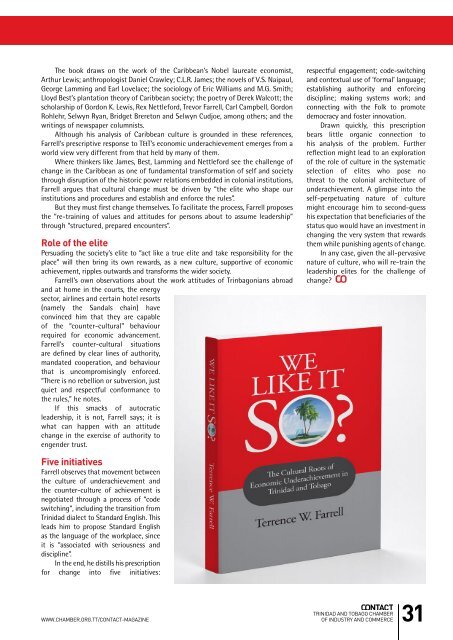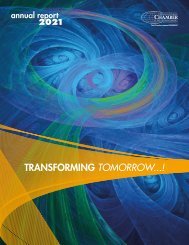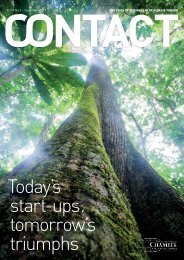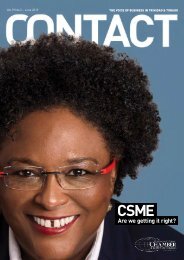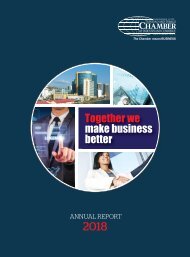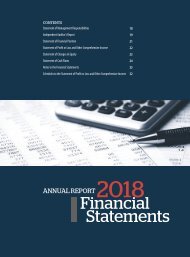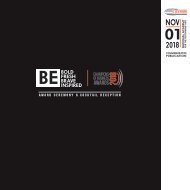Create successful ePaper yourself
Turn your PDF publications into a flip-book with our unique Google optimized e-Paper software.
The book draws on the work of the Caribbean’s Nobel laureate economist,<br />
Arthur Lewis; anthropologist Daniel Crawley; C.L.R. James; the novels of V.S. Naipaul,<br />
George Lamming and Earl Lovelace; the sociology of Eric Williams and M.G. Smith;<br />
Lloyd Best’s plantation theory of Caribbean society; the poetry of Derek Walcott; the<br />
scholarship of Gordon K. Lewis, Rex Nettleford, Trevor Farrell, Carl Campbell, Gordon<br />
Rohlehr, Selwyn Ryan, Bridget Brereton and Selwyn Cudjoe, among others; and the<br />
writings of newspaper columnists.<br />
Although his analysis of Caribbean culture is grounded in these references,<br />
Farrell’s prescriptive response to T&T’s economic underachievement emerges from a<br />
world view very different from that held by many of them.<br />
Where thinkers like James, Best, Lamming and Nettleford see the challenge of<br />
change in the Caribbean as one of fundamental transformation of self and society<br />
through disruption of the historic power relations embedded in colonial institutions,<br />
Farrell argues that cultural change must be driven by “the elite who shape our<br />
institutions and procedures and establish and enforce the rules”.<br />
But they must first change themselves. To facilitate the process, Farrell proposes<br />
the “re-training of values and attitudes for persons about to assume leadership”<br />
through “structured, prepared encounters”.<br />
Role of the elite<br />
Persuading the society’s elite to “act like a true elite and take responsibility for the<br />
place” will then bring its own rewards, as a new culture, supportive of economic<br />
achievement, ripples outwards and transforms the wider society.<br />
Farrell’s own observations about the work attitudes of Trinbagonians abroad<br />
and at home in the courts, the energy<br />
sector, airlines and certain hotel resorts<br />
(namely the Sandals chain) have<br />
convinced him that they are capable<br />
of the “counter-cultural” behaviour<br />
required for economic advancement.<br />
Farrell’s counter-cultural situations<br />
are defined by clear lines of authority,<br />
mandated cooperation, and behaviour<br />
that is uncompromisingly enforced.<br />
“There is no rebellion or subversion, just<br />
quiet and respectful conformance to<br />
the rules,” he notes.<br />
If this smacks of autocratic<br />
leadership, it is not, Farrell says; it is<br />
what can happen with an attitude<br />
change in the exercise of authority to<br />
engender trust.<br />
respectful engagement; code-switching<br />
and contextual use of ‘formal’ language;<br />
establishing authority and enforcing<br />
discipline; making systems work; and<br />
connecting with the Folk to promote<br />
democracy and foster innovation.<br />
Drawn quickly, this prescription<br />
bears little organic connection to<br />
his analysis of the problem. Further<br />
reflection might lead to an exploration<br />
of the role of culture in the systematic<br />
selection of elites who pose no<br />
threat to the colonial architecture of<br />
underachievement. A glimpse into the<br />
self-perpetuating nature of culture<br />
might encourage him to second-guess<br />
his expectation that beneficiaries of the<br />
status quo would have an investment in<br />
changing the very system that rewards<br />
them while punishing agents of change.<br />
In any case, given the all-pervasive<br />
nature of culture, who will re-train the<br />
leadership elites for the challenge of<br />
change?<br />
Five initiatives<br />
Farrell observes that movement between<br />
the culture of underachievement and<br />
the counter-culture of achievement is<br />
negotiated through a process of “code<br />
switching”, including the transition from<br />
Trinidad dialect to Standard English. This<br />
leads him to propose Standard English<br />
as the language of the workplace, since<br />
it is “associated with seriousness and<br />
discipline”.<br />
In the end, he distills his prescription<br />
for change into five initiatives:<br />
www.chamber.org.tt/contact-magazine 31<br />
Trinidad and Tobago Chamber<br />
of Industry and Commerce


